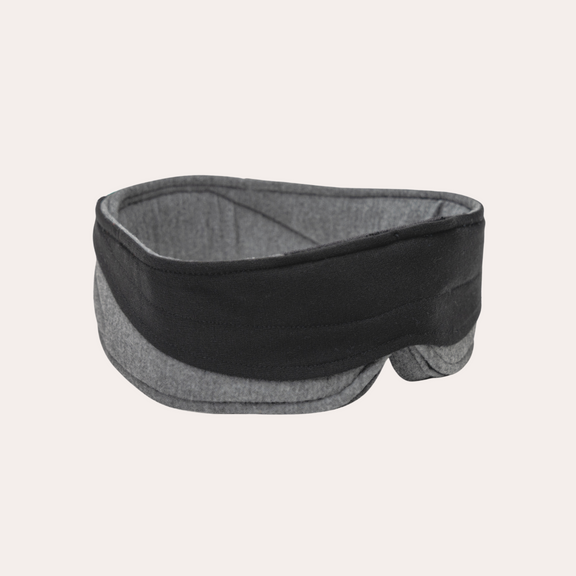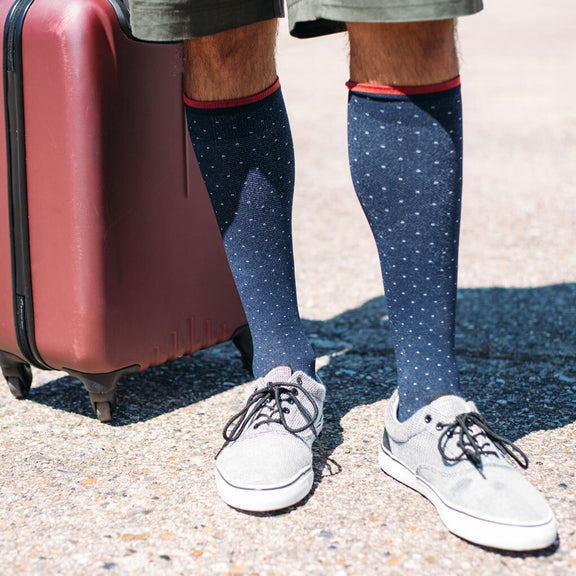Dec 21, 2023
Why Do You Get Ill When You Travel? The Top 5 Reasons Explained
By
Karin Svensson
For most of us, a holiday is a long-awaited event that we plan and dream about for months and is supposed to give us time to relax.
So, how ironic when we come home with viruses as another little memento of those trips.
From the flu to digestive problems, the common cold to more serious issues, in this Trtl blog, we explore the question of why you get ill when you travel and the ways you can protect yourself even when you’re in the air!
Why do you get ill when you travel?
Travelling can be an exciting adventure, but it also brings along an unwelcome companion: illnesses. But why does this happen?
- Exposure to new germs and viruses — When you travel, especially to new places, your body encounters germs and viruses it hasn’t met before. Since your immune system might not be ready for these new challenges, it can lead to you feeling a little bit under the weather.
- Cabin air quality — If your travels include flying, you're going to be breathing in the cabin air. This air gets recycled and recirculated with everyone on board, meaning you can breathe in germs from other passengers. Plus, aeroplane cabins have low humidity, drying out your nose and throat and making it easier for those pesky germs to make themselves at home.
- Disruption to your daily routine — Travel shakes up your regular routine. Late nights exploring, early morning tours, and even the exciting local cuisine can throw off your body's internal clock. Your sleep might suffer, and meal times can go haywire. This disruption, although part of the fun, can leave your immune system a bit more vulnerable than usual.
- Lack of hygiene — On the go, you might not always have access to the best hygiene facilities. Hand washing might be less frequent or thorough, increasing your chances of catching something.
- Mixing with other people — Travel often means getting up close and personal with crowds. Be it on a packed bus, a bustling market, or a busy tourist attraction, you're exposed to a lot more people than usual. And with more people comes more germs.
What illnesses can you suffer from?
When you are travelling, there are a few different bugs and illnesses you can pick up along the way.
1. Respiratory infections
When you’re packed in with fellow travellers in tight, confined spaces for periods of time, germs have a field day, hopping from one person to another.
Respiratory infections such as coughs and colds are some of the most common illnesses you can get when you’re travelling. So, it’s best to take some precautions and make sure you’re stocked up on tissues, just in case!
2. Gastrointestinal issues
Trying local delicacies is part of the travel charm, but sometimes, your stomach disagrees.
From rich, unfamiliar foods to the occasional questionable street food, different places have different standards of food safety, and your digestive system might not be thrilled with the change. Plus, water in some areas might contain organisms your body isn't used to, making you feel unwell.
3. Jet Lag
Jet lag is a disruption of the body’s circadian rhythm — which is the internal clock we have in our brains that helps to regulate our sleep-wake pattern — when you hop through different time zones.
It can leave you wide awake when the world insists it's time for bed or snoring when everyone else is wide-eyed. Find out more about the best tips for successfully avoiding and beating jet lag with our guide.
4. Deep Vein Thrombosis (DVT)
When you’re stuck on a long-haul flight, chances are you’re not able to stretch out or move around a lot. However, this lack of movement can lead to something known as deep vein thrombosis (DVT).
DVT is a medical condition where a blood clot forms in a deep vein, and it can be dangerous if left untreated. Get set for any flight with our Trtl Travel compression socks with a gentle graduated compression of 15-21 mmHg to keep your legs healthy while travelling by improving blood flow and reducing swelling.
Find out more about keeping DVT at bay with our guide.
5. Skin problems
New climates, different water, exposure to sun and wind – your skin notices all of these. You might experience dryness, breakouts, or even allergic reactions whilst you’re on holiday as your body tries to adjust.
What should you do if you get sick while on holiday?
If you get sick while you’re on holiday, it’s important to make sure you take the appropriate steps to manage your situation and recover as quickly as possible.
- Assess the severity of your symptoms — It’s crucial to determine how serious your illness is. Common issues like a cold or minor food poisoning can often be managed with over-the-counter medicines, but more severe symptoms can require help and advice from a doctor.
- Seek medical help if needed — If your symptoms are severe, persistent or worrying, don’t hesitate to seek medical help. You may have to visit a local clinic, hospital or walk-in centre.
- Stay hydrated and rested — Rest is key to recovery. Make sure that you’re getting enough sleep and staying hydrated, especially if you’re in a hot climate or have symptoms like diarrhoea or vomiting.
- Inform your travel insurer — If you’ve taken out travel insurance, inform your insurer of your illness, especially if you need medical care, have gone to the hospital or if your illness affects your travel plans. From here, they can then advise on covered expenses.
- Practise good hygiene — To prevent the spread of your illness to others, make sure to practise good hygiene. Regular hand washing, using hand sanitiser and avoiding close contact with others are key if you have a contagious illness (and don’t want to spread it to others in your group!).
- Adjust your travel plans — Depending on the severity of your illness, you might need to adjust your travel plans. You may need to adjust your stay, postpone any activities you have planned or even return home early if necessary.
Remember, your health is the most important thing. Don’t push yourself to continue with your travel plans if you’re not feeling your best.
Tips to avoid post-flight illnesses
To reduce the risk of post-flight illnesses, you can consider:
-
Wearing a mask — Especially during flu season, wearing a mask can greatly reduce your exposure to airborne illnesses and pathogens. Masks are effective at filtering out a significant portion of particles that contain viruses and bacteria that can be easily passed between each other.
- Keeping moving — Staying active during your flight can help improve circulation and reduce the risk of conditions such as deep vein thrombosis (DVT). Try to stretch, walk around the cabin or do simple in-seat exercises periodically. Find out more about keeping active and the health impacts of poor ergonomics on planes.
- Boost your immune system — In the days leading up to your flight, focus on strengthening your immune system. Opt for a balanced diet rich in fruits and vegetables, get plenty of sleep, manage your stress levels and consider taking supplements like Vitamin C or Zinc to boost your immune system.
- Stay hydrated — The low humidity in aeroplane cabins can lead to dehydration, which, in turn, can make you more susceptible to illnesses. Make sure to drink plenty of water before, during and after your flight --- a reusable bottle, like the Trtl Travel Flask, is great for staying hydrated on the go. Avoid excessive alcohol and caffeine, as they can make you even more dehydrated!
- Use disinfectant wipes — Bring along disinfectant wipes to clean surfaces around you, like your seat, tray table, armrests and seat-belt buckle. These areas can harbour a lot of germs, so wiping them down at the start of your flight can reduce your exposure to these pathogens and developing a nasty bug.
How do I know if my post-flight symptoms are serious?
Determining whether your post-flight symptoms are serious can be challenging if you don’t know what you’re looking for. But here are some guidelines to help you evaluate your condition and what it means:
1. Fever
A high fever can be a sign of a serious infection. It’s particularly concerning if it’s over 38°C in adults, lasts more than a couple of days, or is accompanied by other symptoms like chills, severe body aches and a sore throat.
These could indicate something a little more serious, like flu, Covid-19 or another type of viral or bacterial infection. Persistent or very high fevers warrant a trip to the hospital or walk-in centre.
2. Shortness of breath or chest pains
These symptoms are critical, especially if they occur suddenly. Shortness of breath may feel like you can’t get enough air or are struggling to breathe, and chest pain might feel like a squeezing or pressing sensation.
If you’re experiencing any of these symptoms, it could indicate something more serious, like a pulmonary embolism (blood clot in the lungs) or cardiovascular issues like high blood pressure or a stroke.
3. Persistent vomiting or diarrhoea
Vomiting and diarrhoea are often symptoms of less serious conditions like food poisoning or a stomach virus, but if they persist for more than 24-48 hours, especially without signs of improvement, they can lead to extreme dehydration.
If you’re unable to keep fluid down, you must seek immediate medical attention.
4. Severe headache or dizziness
A headache that is unusually severe — especially if it’s different to any headache you’ve ever experienced before — could be a sign of a serious condition like a stroke or meningitis.
Dizziness that is acute or accompanied by symptoms like double vision, difficulty speaking or coordination problems is also a red flag that requires immediate attention.
5. Unusual fatigue or confusion
Feeling extremely tired, to the point that you’re exhausted, confused, disoriented or have memory problems, can be the trigger for more serious infections such as encephalitis — an inflammation of the brain — or even hypoxia — low oxygen levels.
6. Rash or skin changes
Following a flight, if you notice a change in your skin or a rash, it can be extremely concerning.
Whether the rash is painful, accompanied by a fever or is spreading rapidly, it could be a sign of something more serious like an allergic reaction or infection.
Travel the right way with Trtl Travel
Getting ill while you travel isn’t the best, but sometimes it just happens. Whether it’s exposure to new germs or trying new foods that don’t necessarily agree with you, it’s important that you have a plan in place to ensure that, even if you are ill, you’re as comfortable as you can be.
And, speaking of comfort, It’s also important that you remain in complete comfort wherever you are, and that’s why our travel pillows will leave you feeling refreshed at your destination, whether it’s a quick trip of a few hours or a long-haul flight.
To find out more helpful tips and tricks for all things flying, check out our blog page.




















